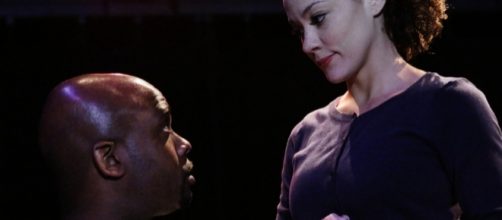Following up his recent Broadway debut in the a cappella musical “In Transit” the world-famous beatboxer Chesney Snow is set to debut his solo show titled “The Unwritten Law” at Dixon Place on July 30 through August 14, 2017.
Chesney Snow workshopped the theatrical production at the theater in January 2017 and was asked to return to stage a full production this summer. The show chronicles his personal experiences throughout his life, taking audiences on his journey from homelessness to a career on the Broadway stage and beyond. Using a combination of spoken word, dance, original music, and his signature, stunning beatboxing skills, Chesney Snow’s play is an unforgettable evening at the theater.
Chesney Snow recently spoke about his experiences creating it--as well as his overall career as a beatboxer and theatrical entertainer--via an exclusive interview.
Songs, performing arts, and writing
Meagan Meehan (MM): What prompted you to enter the field of performing arts and how did you initially get interested in becoming an entertainer?
Chesney Snow (CS): I decided to commit myself to the study of performing when my family was living in a homeless shelter. When we went to school, it was an English Language Arts class that introduced me to Shakespeare. That was when I got “bit by the bug,” as they say. My interest in becoming an entertainer started in kindergarten at True Vine church in Chicago.
The children were asked to memorize a chapter of psalms and recite it word for word in front of the church without error. It was a competition that I won. The applause from that experience was one of my earliest memories.
MM: "The Unwritten Law" is a personal play about your life, so was it difficult to broadcast so much of your history on stage?
CS: In short, yes. The show is deeply personal, and I had to speak with my family about this. Not everyone in the family is comfortable with it, but I was told to just tell the truth. That's what I have done. I was also fortunate to have a wonderful collaborator in Rebecca Arends that helped the process tremendously. She helped guide and contextualize the story.
She is an amazing artist, and I love her attention to detail. Anytime you put yourself out there on stage; you’re opening the door to criticism. That is intensified when you are exposing the underbelly of your own life. At the same time, it can be healing. It helps others heal, and it is the power and spirit of theater that guides me through this. It is very, very difficult.
MM: You've acted on both stage and screen, so do you prefer one medium over another?
CS: I love both, but my heart is on the stage. There is a magic that happens there that just captures my heart.
MM: You're now performing at Dixon Place, so how did you find out about them and what interested you in writing plays?
CS: Dixon Place is legendary among artist/performers in NYC.
Any lover of the theater would need to know about this great place. I was brought there by my friend Yalinidream to attend a performance. I began writing short stories when I was a child. I was fascinated with reading, and as I got older, I wrote songs and poetry pretty religiously. Writing a play came out of necessity, I suppose. I knew I had a story to tell. I could not seem to break into other's plays. Either there were no parts for me, or I simply couldn't find ones that spoke to me. So, I decided I had to write the work for myself.
Beatboxing, poems, and advice
MM: You're also into beatboxing, so how did you get interested in that?
CS: Beatboxing came out of necessity too. We emulated the old school hip hop culture when I lived in Mississippi.
I would write songs with my cousin - he would rap, and I would beatbox, then he would beat on buckets while I rapped. I never imagined beatboxing would take me to the places I have been.
MM: You've started beatboxing associations and tournaments, so what kinds of experiences and feedback have you gotten from those?
CS: I was part of a growing culture that began to organize. It's been amazing to build a platform for other artists to mature and grow. It gave me the experience of producing. I receive a lot of love from the beatbox community for what I created in America. For many years, it was very difficult, but it has paid off beautifully in the end.
MM: You are also a poet and a songwriter, so are any of your poems published or songs recorded?
CS: I have an album called “Spoken Love” on Warner Music you can find on Spotify. If you search online, you can find various songs and some poems I have written as well.
MM: What are your next big projects and some of your primary goals for the future?
CS: Right now, I'm focusing on “The Unwritten Law” and the life this show will have at Dixon Place and beyond. I am also very excited about an upcoming project I'm working on with the incredible Ruben Santiago-Hudson and Regina Taylor, but I can't really say too much yet because it's not public.
MM: Can you offer any words of advice to aspiring entertainers and/or beat-boxers and is there anything else that you would like to mention?
CS: My advice to beat boxers would create work for yourself.
Don't focus just on auditioning. Tell a story as Bobby McFerrin does. Very little has come from auditions for me. Most of my work has come from word of mouth or from someone seeing my own original work live.


